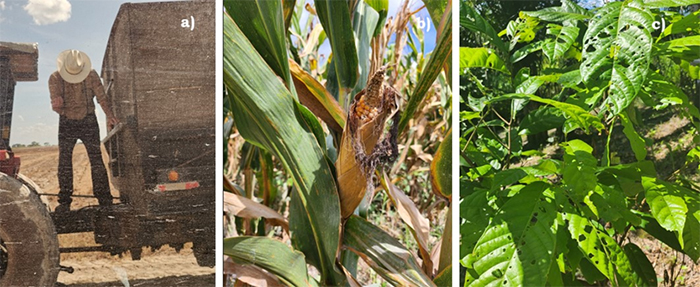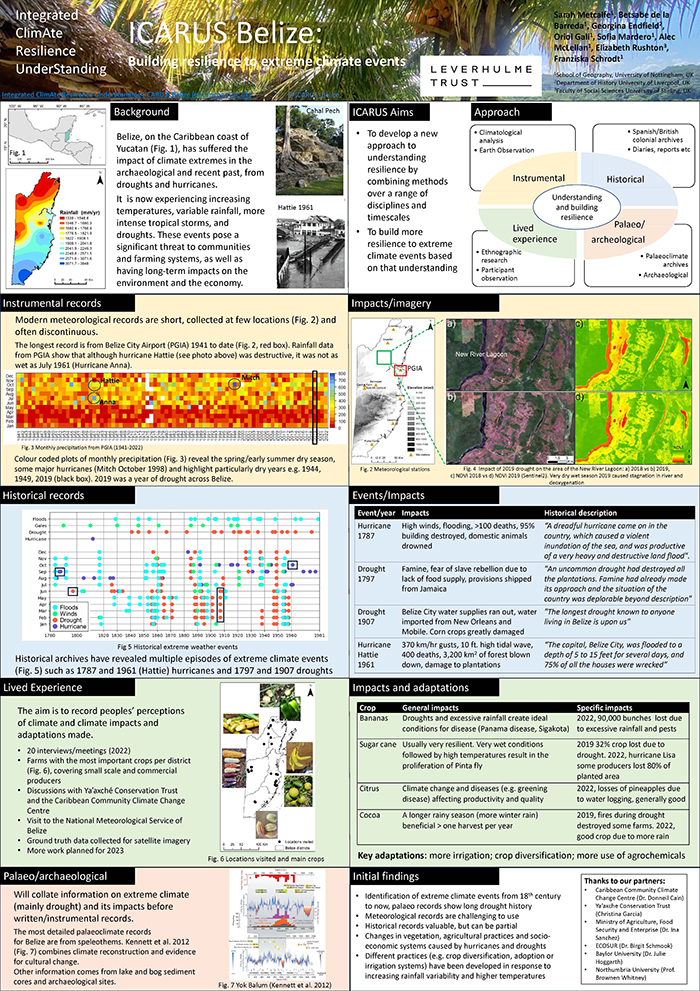View the latest news updates from the Integrated ClimAte Resilience UnderStanding (ICARUS) Belize project.
July 2025
The project has now come to an end, and four publications are currently under revision or submission to international journals to disseminate our results. Stay tuned for the latest publications!
January 2025
A third and final visit to Belize is planned for January 15-30. During this visit, three workshops will be organised at the same locations as those during the second fieldwork period to present results, share reports and findings, and receive feedback from participants. Meetings will also be held with our Belizean partners to present and discuss the project's outcomes.
September 2024
On September 10, 2024, findings from the ICARUS project were presented at the Annual Conference of the National Sustainability Society at the University of Washington in Seattle, WA. The presentation, "Livelihood Adaptations in the Context of Uncertainty and Risk: Understanding the Perspectives of Farmers in Present-Day Belize," focused on the challenges facing traditional agriculture and livelihoods in the Belize District, as well as the responses and adaptations of local farmers.
August 2024
Presentation of ‘Socio-Economic and Environmental Impacts of Hurricanes and Droughts in Colonial Belize (1787-1981)’ at the 4° World Congress of Environmental History at the University of Oulu, Finland, on August 23rd. The presentation was part of a panel entitled ‘Altered Trajectories: Socio-Economic Impacts and Landscape Transformations due to Extreme Climate events in Historical Times’ and highlighted the economic and environmental impacts of extreme events in British Colonial Belize, including the 1787 hurricane and the droughts of 1871, 1889 and 1955.
June 2024
ICARUS project members met in Nottingham to discuss findings and project advances.
March 2024
Visit to the London School of Economics Library. The collection of annual reports published by the department of Agriculture (1970s-1980s) and regional districts authorities (1950s) revealed important instrumental records detailing abnormal precipitation patterns across the country, such as those recorded in late 1974.
February 2024
Visit to the special collections of the Cambridge University Library in Cambridge, UK. The main focus was the study of 19th and 20th century British colonial publications, including annual reports published by the Department of Agriculture (1935-1967), annual medical reports (1910s-1920s) and 19th century almanacs (1870s-1880s). These sources documented numerous extreme climate events across the country and highlighted agricultural adaptations and strategies to respond to challenges such as the drought of 1955.
January 2024
- Our team carried out the last fieldwork campaign in Belize between 14–30 January 2024. The aim was to present results, share reports and findings, and gather feedback from participants.
- We organised two main workshops with farmers:
-
- Northern Belize (Corozal, SIRDI, 17 January): around 15 farmers attended (figure 1).
-
- Southern Belize (Ya’axché, Toledo, 24 January): around 10 farmers participated (figure 1).

Figure 1: Meeting at SIRDI

Figure 2: Workshop in Ya’axche
-
In San Ignacio, Cayo (20 January) results were also presented to members of the Belize Botanic Gardens.
-
During these activities, we presented the project’s key findings, discussed them with farmers and institutions, and collected valuable feedback. Figure 3 shows a photo with some of the participants with the final poster that were produced and delivered to participants.

Figure 3: Final poster for Toledo
-
We also met with a range of partners and institutions (see Fig 4 and 5), including:
- Ministry of Agriculture (MoA)
- Caribbean Community Climate Change Centre (CCCCC)
- Ya’axché Conservation Trust
- Local authorities in Corozal, Cayo, and Toledo
- Several of the farmers previously interviewed
-
In addition, we had a formal meeting with the British High Commissioner in Belize.

Figure 4: follow-up meeting with Gary Canto, Maya Green Growers Cooperative

Figure 5: follow up meeting with James Nesh of Oxmul Coffee
October 2023
- We organised three workshops across Belize: in the North (Corozal, October 13), the Centre (Cayo, October 3), and the South (Toledo, October 10). A total of 42 farmers participated. During these workshops, farmers: a) created timelines highlighting significant climatic and non-climatic events impacting their agricultural activities, b) discussed the primary challenges facing agriculture in the country, and c) proposed potential solutions to address these challenges (Figure 6).
- On October 26, the ICARUS Belize Project presented at the 8th Binational Seminar Mexico – Belize at the University of Belmopan, with a talk ‘Building climate resilience using interdisciplinary approaches: in Belize”.
- Visit to Belize Archives and Records Service, Belmopan, Belize. The primary objectives were to identify climate-related information within historical records housed in the archive, a repository that has been under-studied by environmental historians. A wealth of climate-related information was obtained for the period 1910-1950, enabling the identification of extreme events such as the severe floods of 1922 and 1924 and the significant drought of 1949. Access to colonial annual reports from the six districts of Belize provided detailed descriptions of regional extreme events and their impacts during the first half of the 20th century.
- The ICARUS project was presented in the UK - Belize Association annual meeting in the UK with a presentation titled: ‘New approaches to understanding resilience to climate change in Belize: The ICARUS Project’.
- The project was presented at the Provost’s Seminar Series University of Nottingham Malaysia with the presentation entitled: ‘New approaches to understanding resilience to climate change in Belize: the ICARUS Project’.

Figure 6: a) Map showing the places where interviews and workshops were conducted in October 2023, b) Workshop in Cayo District, c) Workshop in Corozal District, d) Workshop in Toledo District.
September 2023
- A second round of fieldwork was conducted in Belize to better understand the dynamics between climate change, extreme events, agriculture, and rural livelihoods (Figure 7). 50 interviews were carried out across the country. Key findings from this field work were:
- Agriculture faces three main challenges: climate change, pests and diseases, and high input costs. Locally, other issues include crop smuggling from Mexico, marketing challenges, soil erosion, lack of training, limited seed access, and poor road conditions.
- Climate change manifestations include rainfall variability, rising temperatures, and the increase in more extreme events like hurricanes and droughts, perceived mainly since early 2000s and increasing during the last five years.
- Farmers have adapted by installing irrigation systems, diversifying crops, using agrochemicals, altering the agricultural calendar, adopting climate-smart techniques, diversifying income sources, and forming cooperatives to access international funds.

Figure 7: a) Mennonite harvesting sorghum, b) Maize during drought, c) Cocoa plant affected by pest damage.
August 2023

Figure 8: ICARUS poster presented at RGB-IBG Annual Conference 2023
May 2023
ICARUS project members met in Nottingham (Figure 9).

Figure 9: Meeting of the ICARUS project members at the University of Nottingham.
March 2023
New blog by Betsabé de la Barreda-Bautista, Sofia Mardero, Oriol Ambrogio Gali, Franziska Schrodt and Sarah Metcalfe.
January 2023
- The first field work campaign was held (Figure 10).
- Meetings were held with the advisory panel in Belize: the Caribbean Community Climate Change Centre, Ya’axché Conservation Trust, the Ministry of Agriculture, Food Security and the National Meteorological Service of Belize.
- A workshop was held at the Central farm agricultural station in Cayo, with members of the Ministry of Agriculture and farmers from different parts of Belize.
- ICARUS project members met with the UK High Commissioner in Belize.

Figure 10: a) Cacao in S in Belize, b) visit to Sugar Cane Industry Research Institute, c) washing tanks at banana plantation, d) small holding W C Belize.
February 2022
ICARUS Belize project started.